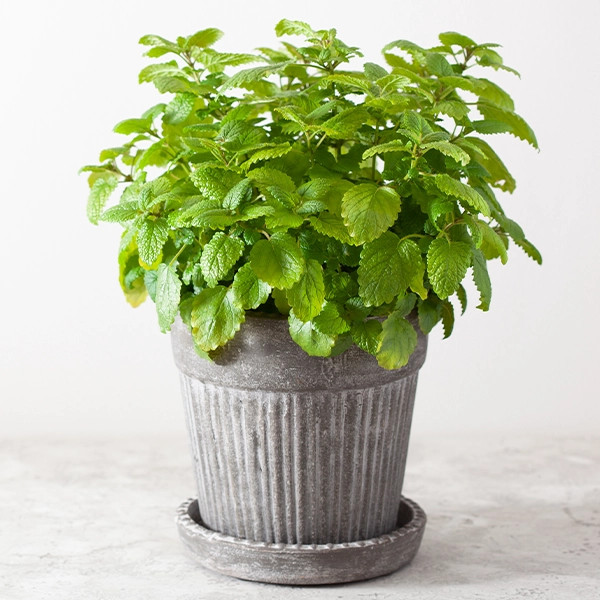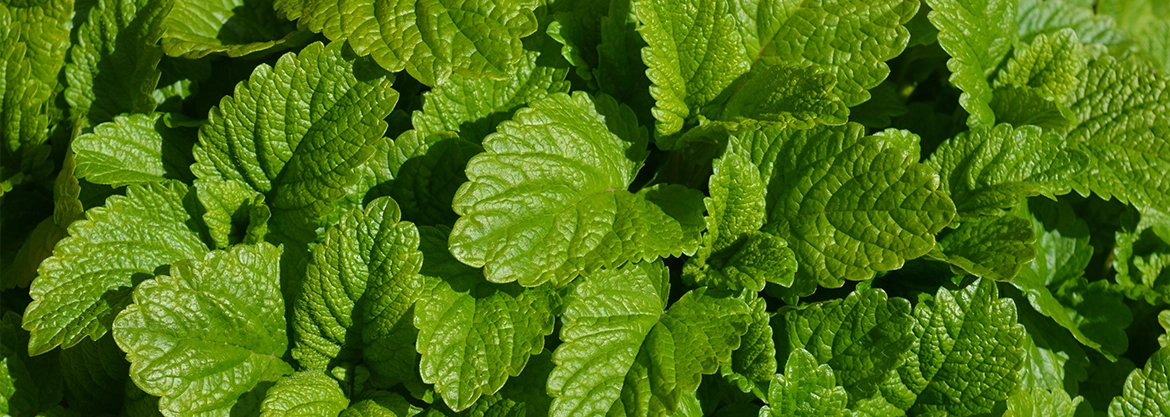Lemon balm – nature’s treasure for stress and insomnia

Lemon balm is a well-known herb with extraordinary properties, valued for centuries for its beneficial effects on the body. It has gained particular popularity as a natural remedy for relaxation and improving sleep quality. But does lemon balm really calm the mind and help you sleep? What other secrets are hidden within its green leaves? Let’s closely examine this remarkable gift from Mother Nature!
Summary:
- Lemon balm – a green beauty with a lemony aroma
- Lemon balm – a treasure trove of beneficial properties
- Lemon balm for relaxation, sleep, and more…
- How to safely and effectively use lemon balm?
- Lemon balm and yerba mate – an oasis of calm and a volcano of energy
Lemon balm – a green beauty with a lemony aroma
Lemon balm, also known as melissa (Melissa officinalis), is a small plant reaching up to about 60 cm in height, with dark green, heart-shaped leaves and serrated edges. Its leaves are covered with fine fuzz. When fresh, they emit a strongly lemony, pleasant scent that not only delights the nose but also has a calming effect – hence melissa is often referred to as “lemon balm”. In English, its common name is lemon balm, while in French, it is known as citronelle. Interestingly, dried lemon balm leaves lose much of their lemony fragrance. The official Latin name, Melissa, derives from two words: the Greek melitta – "bee" and the Latin mel – "honey." This is a nod to an interesting characteristic of the plant. Melissa is an excellent nectar source for bees. Its beautiful, delicate flowers blooming in spring attract bees that love to gather its nectar! Lemon balm honey is valued for its subtly lemony taste. Among beekeepers, there is an old tradition of rubbing the inside of a hive with a bundle of fresh melissa leaves to encourage bees to settle there. Similarly, before working in the hive, beekeepers rub their hands with the leaves – the soothing aroma of melissa calms the bees significantly. Fresh lemon balm leaves are widely used in the kitchen – they add a delightful lemony flavour and aroma to salads, beverages, and desserts. Meanwhile, essential oils derived from melissa, known for their calming and refreshing properties, are used in cosmetics as an ingredient in creams, tonics, or massage oils. Lemon balm is a herb with versatile applications!
The history of lemon balm dates back to ancient times. Even then, the Greeks and Romans appreciated its beneficial effects on the body and used it in natural medicine. Early mentions of the plant can be found in the writings of Dioscorides and Theophrastus. Melissa was used to improve digestion, ease headaches, and calm the nerves. In the Middle Ages, it was one of the main ingredients in "love elixirs" and tonic drinks. It was believed to have almost magical properties – dispelling melancholy, healing broken hearts, and restoring youth. While most of these "miraculous" properties haven’t been scientifically confirmed, lemon balm remains one of the most popular herbs today, readily found in nearly every home medicine cabinet or herb shelf for various ailments. Herbal teas with lemon balm are commonly drunk during stressful moments to calm the nerves, aid sleep, or ease stomach and intestinal issues. So, does lemon balm really work? Let’s find out!

Lemon balm – a treasure trove of beneficial properties
Lemon balm is a veritable treasure chest of valuable active ingredients that provide it with its extraordinary medicinal properties. It contains essential oils (including citronellal, citral, linalool, and geraniol), polyphenols, with the most prominent being rosmarinic acid and caffeic acid, as well as vitamins and minerals. These substances make melissa so versatile and – most importantly – effective!
The essential oils present in lemon balm give it its characteristic lemony fragrance and have strong calming properties. Polyphenols such as rosmarinic acid and caffeic acid act as powerful antioxidants that help combat free radicals in the body. Melissa’s impressive antioxidant properties help protect cells from damage and slow down the ageing process. Lemon balm also exhibits antibacterial properties, making it effective in fighting various infections. Additionally, it has mild diuretic properties, helping to remove excess toxins from the body and supporting kidney function.
Lemon balm for relaxation, sleep, and more…
Alright, so how does lemon balm work? Its mechanism of action lies in the synergy of the active ingredients mentioned earlier. These substances primarily affect the nervous system, helping to reduce stress and anxiety, and additionally supporting the digestive and cardiovascular systems. Melissa is especially renowned as a natural remedy for relaxation and sleep. It influences brain receptors responsible for feelings of relaxation and calm – a highly desirable effect in today’s high-pressure world. Regular consumption of lemon balm can significantly improve mood and quality of life, especially during tough, stressful periods. Lemon balm also has a beneficial effect on sleep. Its gentle effect helps with falling asleep and improves sleep quality. Its relaxing impact on the nervous system makes it easier to unwind and drift off. Does lemon balm lower blood pressure? Yes, its hypotensive properties have been confirmed in scientific studies. Its polyphenol content supports cardiovascular health, and its calming effect reduces nervous tension and, consequently, blood pressure. But that’s not all! Melissa is also effective in alleviating gastrointestinal issues such as bloating, indigestion, or stomach pain. Its antibacterial and anti-inflammatory properties promote digestive health.
How to safely and effectively use lemon balm?
The “lemon herb” can be used in many different ways, depending on needs and preferences. The most popular and simplest form is a tea made from dried lemon balm leaves. To prepare it, simply pour boiling water over the dried leaves and let them steep for about 15 minutes. This tea can be consumed warm or cold, depending on your preference. Another popular option is lemon balm tea, widely available in grocery stores, pharmacies, or herbal shops in convenient tea bags. However, it’s crucial to pay attention to the quality of the dried herb, as some widely available lemon balm products may lack the most valuable active substances. Always choose products from reliable sources! Melissa is also available in the form of extracts, which can be added to beverages or used as dietary supplements. These extracts are more concentrated and can be a convenient solution for those who lack the time to prepare teas. And how long does it take lemon balm to work, and when are its effects noticeable? This is a common question from those trying the herb for the first time. While individual responses may vary, initial positive effects can generally be felt around 30 minutes after drinking the tea. Regular use yields the best results, particularly for issues like sleeplessness, stress, or nervous tension.
Lemon balm – contraindications. Who should avoid using it?
Although lemon balm is a herb with many health benefits and is generally considered safe, there are a few contraindications. These primarily concern pregnant and breastfeeding women, who should always consult their doctor before using herbal teas. This caution is due to a lack of sufficient data and studies to confirm the safety of melissa during pregnancy and lactation. People on sedative or sleep-aid medications should also exercise caution, as lemon balm may amplify these effects.
Lemon balm and yerba mate – an oasis of calm and a volcano of energy
The combination of lemon balm with yerba mate is an excellent way to balance stimulation and relaxation. These two plants, which at first glance might seem entirely different, actually complement each other perfectly. Yerba mate, known for its stimulating properties, is a fantastic alternative to coffee. It acts gradually and harmoniously, energising without causing jitters. The addition of lemon balm to yerba mate introduces a calming and soothing element, making the mate tea experience even more balanced and enjoyable. Naturally, our store features products that combine these two amazing plants. For anyone curious about this synergy, we recommend trying the mild, aromatic CBSé Hierbas Cuyanas, made by the renowned Argentine producer. Alongside mate and lemon balm, you’ll find even more aromatic herbs in the pack: coriander, fennel, mint, poleo, and boldo. For those looking for something gentler, consider the rich and aromatic herbal tea blend from Mary Rose – Herbal Dreams, which combines distinctive gunpowder green tea, lemon balm, chamomile, mint, jasmine flowers, eucalyptus leaves, and basil. It’s an excellent option for any time of day!
Sources of information:
- Wikipedia: Lemon balm.
- A. Shakeri, A. Sahebkar, B. Javadi, Melissa officinalis, L. – A Review of its traditional uses, phytochemistry and pharmacology, Journal of Ethnopharmacology, 2015.
- S. Miraj, R. Kopaei, S. Kiani, Melissa officinalis L: A Review Study with an Antioxidant Prospective, Journal of Evidence-Based Complementary & Alternative Medicine, 2017.




